Did you see the title and roll your eyes? I know. I’ve been there. There’s only so much you can do to protect your family from the toxins of the world and just when you think you’ve got a lot of it covered, you learn about something else to avoid or change. Here’s the thing, when you know better you do better and a non-toxic shower curtain is an easy fix that you can control, unlike so many of the toxins in our environment that you can’t.
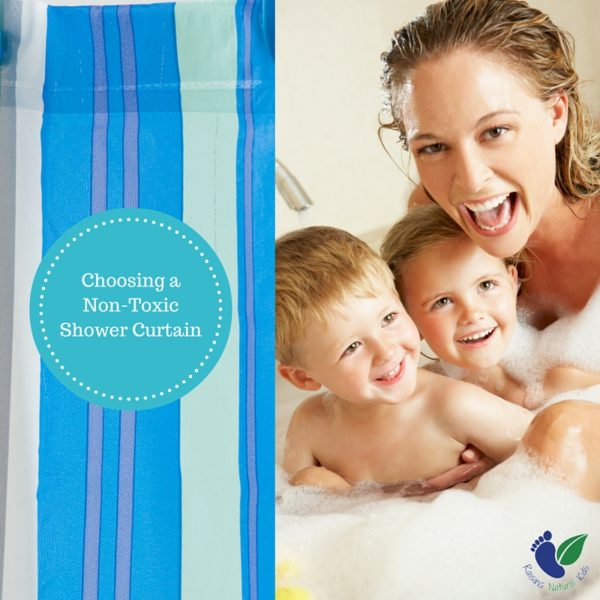
This post contains affiliate links. Please see my note at the end of the post.
So let’s start with what makes many shower curtains, especially the liners, toxic. Many curtains and liners are made out of PVC. You may recognize this from the fresh smell that comes from the curtain when first unpacking it – it’s deceiving really, something that can smell like fresh water (at least that’s what it smells like to me at times) can really be so toxic. Really though, you can’t bottle fresh! Not all PVC smells like this, however. No matter the smell (just trying to give you a point of reference), PVC, especially in the form of a shower curtain, is bad. Here’s why: “Vinyl chloride, the chemical used to make PVC, is a known human carcinogen, according to the World Health Organization’s International Agency for Research on Cancer (IARC)”(Healthy Child Healthy World). It also causes reproductive damage, it irritates the nasal passages and the lungs, and it can cause headaches, among other things. One fact about vinyl chloride I find extra scary is this: An excess of spontaneous abortions has been reported among spouses of workers who had been exposed to vinyl chloride (Hazardous Substance fact Sheet). Yes, I realize this wasn’t from exposure in the shower, but the fact is that if it can do this much damage secondhand, it’s not safe to have around in an area where it’s used daily, especially in a shower, because the chemicals used to make PVC are released under warm and moist conditions, thus making a shower a dangerous place for these already hazardous compounds. What makes them leach is that the additives to PVC do not form a chemical bond with the plastic but exist within the PVC as a mixture. As a result plasticisers and other additives can migrate from the PVC polymer into the environment (Greeenpeace).
PVC also produces:
Dioxins – Dioxins are highly toxic and can cause reproductive and developmental problems, damage the immune system, interfere with hormones and also cause cancer (World Health Organization).
Phthalates – “In the past few years, researchers have linked phthalates to asthma, attention-deficit hyperactivity disorder, breast cancer, obesity and type II diabetes, low IQ, neurodevelopmental issues, behavioral issues, autism spectrum disorders, altered reproductive development and male fertility issues”(The Guardian).
Ethylene Dichloride – “Exposure to low levels of ethylene dichloride can occur from breathing ambient or workplace air. Inhalation of concentrated ethylene dichloride vapor can induce effects on the human nervous system, liver, and kidneys, as well as respiratory distress, cardiac arrhythmia, nausea, and vomiting. Chronic (long-term) inhalation exposure to ethylene dichloride produced effects on the liver and kidneys in animals. No information is available on the reproductive or developmental effects of ethylene dichloride in humans”(US Environmental Protection Agency).
Lead – The effects of lead normally accumulate over time through a series of low level doses. Children under the age of 6 and fetuses exposed through lead in their mother’s blood are most susceptible. Lead poisoning has been linked to anemia, central nervous system, kidney and immune system damage and learning disabilities. The degree of damage is dependent on the amount of lead taken into the body over time (UofM Department of Environmental Safety).
Organotins, Cadmium and Organochlorines are also found in PVC products.
Non-Toxic Options to PVC Shower Curtains
Many people are under the false assumption that EVA or PEVA liners are safe. While they are better than PVC, as they are made from chloride-free vinyl, they are still made from petroleum and contain chemicals, like plasticisers, that are used to make it pliable.
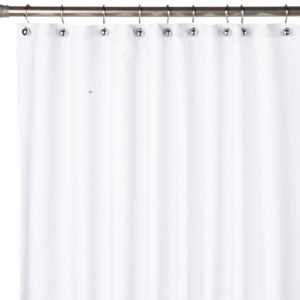 If you are looking for something on the more affordable side, especially if you are looking to make a quick change, a nylon shower curtain is the way to go. This is the one I haveThis is the one I have. I was a little wary upon purchase, as I got it to double as a liner and as a curtain and I wasn’t sure if it would leak, being made of a light fabric, but we’ve had it for five months now and there has been no leakage and no mold, to boot. It’s really more liner material, as it’s nothing decorative, but right now I don’t have time to make the bathroom pretty, so it serves us just fine as both.
If you are looking for something on the more affordable side, especially if you are looking to make a quick change, a nylon shower curtain is the way to go. This is the one I haveThis is the one I have. I was a little wary upon purchase, as I got it to double as a liner and as a curtain and I wasn’t sure if it would leak, being made of a light fabric, but we’ve had it for five months now and there has been no leakage and no mold, to boot. It’s really more liner material, as it’s nothing decorative, but right now I don’t have time to make the bathroom pretty, so it serves us just fine as both.
Hemp shower curtains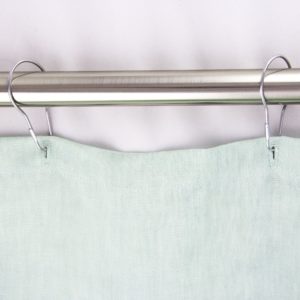 have been around for a while. These are nice and thick, making for a great curtain, but have a tight enough weave that no liner is needed. Organic hemp fabric is naturally resistant to mildew, fungi and bacteria, so these will last a long time and is worth the investment. Hemp curtains/liners are more expensive than the nylon ones and less expensive than the organic cotton. I find they last a lot longer and are more sturdy that the nylon and are just as good as the cotton shower curtains.
have been around for a while. These are nice and thick, making for a great curtain, but have a tight enough weave that no liner is needed. Organic hemp fabric is naturally resistant to mildew, fungi and bacteria, so these will last a long time and is worth the investment. Hemp curtains/liners are more expensive than the nylon ones and less expensive than the organic cotton. I find they last a lot longer and are more sturdy that the nylon and are just as good as the cotton shower curtains.
Organic cotton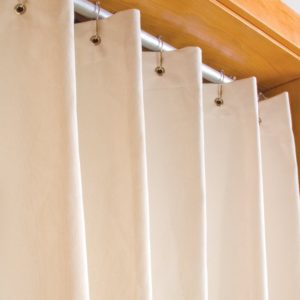 is used more for curtains. You can double it as a liner, but it will take longer to dry. Pottery barn usually carries some organic cotton ones as well. If you are going for something pretty to match decor, an organic cotton curtain is the best non-toxic option, as the hemp, though nice, isn’t anything frilly.
is used more for curtains. You can double it as a liner, but it will take longer to dry. Pottery barn usually carries some organic cotton ones as well. If you are going for something pretty to match decor, an organic cotton curtain is the best non-toxic option, as the hemp, though nice, isn’t anything frilly.
Showers aren’t the only dangerous place for PVC. Dishwashers are too. Here’s what to know when shopping for a dishwasher. Learn how to choose a safer hose too!
**Raising Natural Kids serves as an affiliate for Amazon, and links any products we use in our own homes and with our own families to Amazon when applicable. Any monies earned help us to run and maintain this blog.
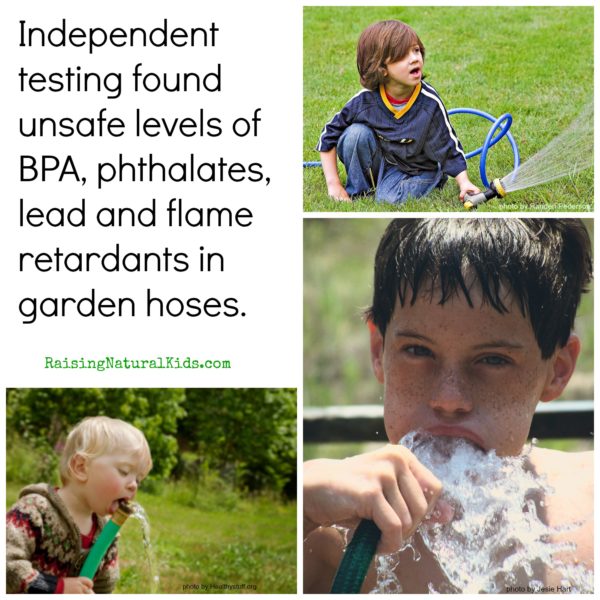
Thank you for this article! I wish the comments had a date stamp on them, but I definitely appreciate the info you shared especially since most other websites referred me to using PEVA. Also, just a note to everyone, Amazon is FULL of counterfeit items.
HI, thanks for the info. I just bought a 100% cotton shower curtain. however it’s not organic. would that be toxic for my health? thank you again.
Much better than PVC. Cotton is heavily treated with pesticides, so keep that in mind.
What do you recommend for liners for drawers, shelves and cupboards in kitchens, baths and bedrooms? Most if not all products I see contain PVC, vinyl, EVA, nonstick coatings, adhesives and other toxic materials.
Thanks for the wonderful information on shower curtains and other products. Since we put our dishes, glasses, clothes, toys and other household items in contact with drawers and shelves, I’d love to know of any safe options.
I am looking for a fabric shower curtain and liner that are NOT antibacterial/anti-mold because these agents consist of toxic chemicals.
Hi, I was wondering about the Nylon shower curtain….it says it’s mildew resistant…..it’s hard to tell if that’s because Nylon is naturally mildew resistant or if it’s because they treat it with chemicals….do you know if they treat it with chemicals?
The company has stated that it is not treated with chemicals and nylon is naturally mildew resistant. In fact, when choosing a dishwasher, I urge people to get nylon coated racks instead of PVC.
Hi, I just purchased the nylon shower liner that you recommended and I just received it. It reeks of chemicals. I’m pretty disappointed as it was not cheap. I’m just wondering if you have any information on nylon shower curtains and their lower toxicity levels. Thanks….and I guess I should’ve read through the comments before my purchase as I’m not the only frustrated one.
Hi! So I did not have this issue at all – and i just purchased my second one a few weeks ago through the same link. I am not sure why some people are having an issue and others are not. Nylon is a safe material, as it is also the material you want to be coating your racks in a dishwasher, rather than PVC. Whatever chemical smell you are smelling isn’t coming from the nylon itself. What does the brand name say on your product in hand? Also, just thinking, you said it is not cheap – the one I linked to is about $19.00, are we talking about the same one? OR the 11.90 one? I just switched the link back to the original one I got as that one no one had issues with as far as I know.
I just bought (and am returning) the 100% nylon shower curtain on Amazon that you referenced above. I asked the company directly if there was anything else to the curtain except for nylon. The response was that they coat the curtain with teflon, and yet in that same response they said there were no toxic chemicals applied. If a shower doesn’t get as hot as an oven to kill parrots, that’s one thing. But do we know enough about whether the teflon is an issue? They made it sound like all curtains have it, but I doubt that. I would like to find a nylon one without any additives like this.
Wow. I am flabbergasted right now! I had checked out the curtain and company about over a year ago. They did not say anything about being coated in Teflon. I am going to get on this right away. In the meantime, I’d go with natural materials like hemp and organic cotton as it is far less likely that companies using those materials would add anything toxic to it. Albeit, it’s super important to make sure it’s from a company not greenwashing. Thank you for letting me know about this. I will get back to you when I have more information!
Update 1 – Upon looking, the shower curtain is not the same one linked to when I wrote the post. I had it linked to a 100% nylon curtain and the one linked also contains polyester. I am changing the link back to one that is 100% nylon, which is naturally water resistant, but I will also be contacting the company for the one I am linking to double check that there is no teflon.
Update 2 – The manufacturer of the original shower curtain listed, which has been removed, says there is no Teflon used on it – this is via Amazon. I am still working on contacting them directly.
Any updates on best 100% nylon liner? What is the brand if so?
Thank you!
working on it!
I used to own a hemp shower curtain. How lovely it was. They are really resistant to water so they can get wet and last looong time. I got mine from Rawgaunique because I am picky and wanted the nice burgundy one to match my bath but you can get cheaper ones in just natural colors and you can even get heavy cotton linen ones.
Mine lasted several years and the bottom kind of unraveled after a while but I was very impressed with it over all. I have a slide door now so I don’t need one but I would buy it again. Hemp used to be used by sailors on their ships to make the sails so you know it is pretty water resistant.
What about PEVA curtains? Are they okay?
From the post “Many people are under the false assumption that EVA or PEVA liners are safe. While they are better than PVC, as they are made from chloride-free vinyl, they are still made from petroleum and contain chemicals, like plasticisers, that are used to make it pliable.”
So what’s the problem with plasticisers?
Plasticizer endocrine disruption: Highlighting developmental and reproductive effects in mammals and non-mammalian aquatic species: https://www.sciencedirect.com/science/article/pii/S0016648014004225